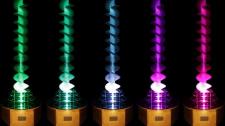CGS-authored

A group of scientists say they want work toward being able to create a synthetic version of the entire human genetic code in the laboratory.
Their hope is that a complete set of synthetic human DNA, known as a genome, could someday lead to important medical breakthroughs.
"We just had a revolution in our ability to read genomes," says George Church, a geneticist at Harvard University who is part of the group that outlined the plan Thursday in the journal Science. "The same thing is happening now with writing genomes."
But science is very far away from being able to create a whole human genome, and the idea of manufacturing human genomes in the lab raises many concerns, critics say.
"The worry is that we're going to be synthesizing entire optimized human genomes — manufacturing chromosomes that could be used ultimately to produce synthetic human beings that they see as improved models," says Marcy Darnovsky, who heads the Center for Genetics and Society.
Scientists first made a synthetic gene in the lab in 1970; it...



